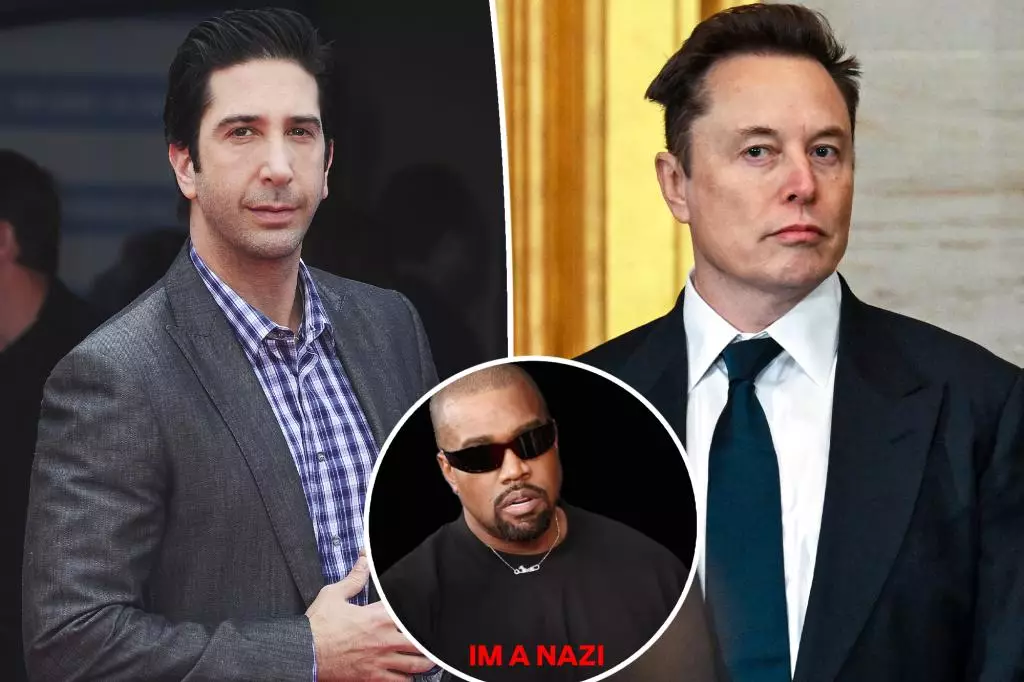In an era where social media platforms wield significant power over public discourse, the words and actions of influential figures resonate deeply within society. Recently, a potent controversy erupted surrounding Kanye West—now commonly referred to as Ye—and his incendiary remarks against the Jewish community. Amid a climate of heightened sensitivity around antisemitism, actor David Schwimmer, known for his role in the iconic TV show “Friends,” voiced his condemnation through a passionate Instagram post. Schwimmer’s intervention highlights the crucial intersection of celebrity influence and social responsibility, prompting a broader conversation about accountability in the digital age.
Schwimmer’s remarks came after Ye unleashed a disturbing string of antisemitic tweets, revealing a blatant disregard for Jewish dignity and invoking a history of hate that continues to reverberate. Schwimmer noted the dangerous reach of Ye’s platform, emphasizing that the rapper’s 32.7 million followers represent an alarming channel for spreading hate. The actor called upon Elon Musk, owner of X (formerly Twitter), to act decisively and remove Ye from the platform, arguing that allowing such rhetoric to proliferate is tantamount to complicity in the violence it begets.
The content of Ye’s tweets is nothing short of alarming. By proclaiming, “I don’t like or trust no Jewish person,” and explicitly identifying as a Nazi, he positions himself on a perilous brink of hate speech and provocation. Such declarations raise a crucial concern: how can platforms like X justify housing discourse that not only marginalizes communities but can incite real-world violence? Schwimmer’s assertions regarding the implications of having a figure like Ye disseminating such dangerous ideas merit serious reflection.
It’s essential to recognize that West’s rants are not just ramblings of a troubled artist; they resonate as echoes of historical prejudice, reminiscent of eras defined by persecution and violence. His claim of “loving Hitler” and his endorsement of racist stereotypes thrusts him into a realm where personal expression devolves into a rhetoric that jeopardizes social cohesion. The gravity of such statements cannot be overstated, and Schwimmer’s call for action underscores the urgency of addressing the ramifications of unchecked bigotry.
Schwimmer’s public outcry serves as a reminder of the power celebrities wield in shaping cultural narratives. In a landscape often marred by silence in the face of injustice, voices like Schwimmer’s can catalyze important conversations about accountability. The actor’s declaration that “silence is complicity” encapsulates the moral imperative for those in the public eye to reject hate speech unequivocally and support marginalized communities.
The battle against antisemitism and other forms of hatred demands collective action—both from individuals and institutions. Schwimmer’s sharing of his thoughts on social media reveals a pivotal movement in celebrity activism, where figures must not only entertain but also engage, educate, and advocate for a more just world. The stakes are high, and the need for moral clarity has never been more pressing.
As Schwimmer identified, social media platforms bear a significant responsibility in moderating speech. The ability to reach millions in an instant grants an unprecedented power that can either uplift or destroy. Given this capacity, systemically addressing hate speech should be a top priority for platform owners.
Moreover, the case of Kanye West illustrates a broader societal issue: there exist mechanisms through which individuals propagate hate under the guise of free speech. This depiction of free speech as an absolute, without regard for the consequences that come along, creates a culture where hate can thrive unimpeded. Schwimmer’s remarks compel us to reconsider the delicate balance between freedom of expression and the ethical obligations that come with it.
The events surrounding Kanye West and David Schwimmer encapsulate a dynamic and often troubling intersection of culture, power, and responsibility in the modern era. Schwimmer’s impassioned plea against Ye’s antisemitism signifies not only a confrontation of hate but a call to action for society at large. This episode serves as a stark reminder that when influential individuals perpetuate harmful ideologies, it becomes imperative for those with platforms and privilege to challenge those narratives.
Rising to the challenge of combating hate requires a profound cultural shift—one rooted in empathy, education, and collective accountability. Through awareness and courageous engagement, society can strive toward a future where all voices are respected and dignified, free from the shackles of bigotry. The road ahead appeals to all of us to foster resilience in the face of hatred and to ensure that history does not repeat itself.

